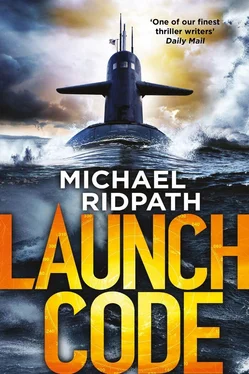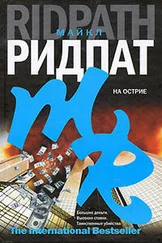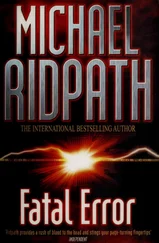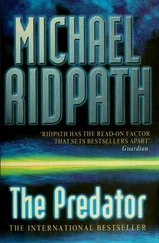I agreed, but I wasn’t at all surprised that the XO hadn’t come down to enlighten us.
‘We don’t even know if war has broken out,’ Lars said.
I shook my head.
‘Do you think the captain knows?’
‘How could he? We would have heard the Alert One alarm if there had been another EAM.’
‘I’m sure that message was an error,’ said Lars.
‘I’m not,’ I said. ‘It might have been. I know we were right to do what we did. But it’s just as likely that there are missiles flying around out there.’
We were both quiet.
‘They would have struck by now, wouldn’t they?’ said Lars.
‘Some,’ I said. It would depend when they were launched and where they were launched from, but if Russia and NATO were flinging thousands of warheads at each other, some would have landed. A lot would have landed.
I tried to imagine it. It was clear what would happen to the direct targets like New York and indeed the New London Submarine Base. Flattened. Massive explosions and temperatures at thousands of degrees. Anyone close to a thermonuclear explosion would die instantly. Millions would be dead in the world’s great cities. Washington. Moscow. London. Paris.
New York.
Donna.
It wouldn’t have hurt. There would have been a brief warning, enough to provoke panic in the powerless civilians who heard it, but actually many New Yorkers would take a while to figure out what the Civil Defense sirens meant.
Then almost instant death.
And what about my parents, on the banks of the Susquehanna? They might still be alive. How long before the fallout would kill them? A day, maybe two at most, given the amounts of radiation in the atmosphere around the eastern United States. I remembered the symptoms from my radiation sickness training: vomiting, diarrhoea, headaches, fever and then death.
‘So if there is a war, what happens to us?’ said Lars.
‘I guess they will let us out of this stateroom. And then we all stay submerged for as long as we can.’ A Lafayette -class submarine could stay under water for at least fifteen years. But humans couldn’t.
‘How long do you figure we’ve got before we run out of food?’
‘We’re a month into the patrol. Three months maybe, with aggressive rationing, perhaps four?’
‘And then what?’
‘We surface somewhere. New Zealand? And hope there are still people alive.’ This was something we had never discussed, or only in jest. I remembered a conversation over a few beers with Craig about giant mutant bunnies. I also remembered laughing at the time.
‘Did you ever see On The Beach ?’ Lars asked.
‘I read the book.’ It was a novel by Nevile Shute set in Australia a year after a nuclear war had wiped out life in the northern hemisphere. The population waited as the radiation cloud drifted slowly southwards. In the end, everyone died.
Everyone.
‘But that was in the fifties,’ I said. ‘There’s going to be much more radiation now. There will be nowhere to go.’
Lars propelled himself at the door and banged. ‘Tell us what the fuck is going on out there!’ he yelled.
The door remained shut.
I tapped Lars on the sleeve. ‘Hey, man. Calm down. There’s nothing we can do here except wait. All will become clear in time.’
Lars pushed himself away from the door and resumed pacing.
I sat back down on the XO’s bunk, my mind a jumble of my parents and Donna. And trees and streams and meadows. Birdsong.
I had thought long and hard about a nuclear war since I had joined the Navy at eighteen; I was sure we all had. But it had always been in the abstract. Now, because it was so real, it was difficult to process.
The 1-MC burst into life. ‘Man battle stations torpedo!’ Usually this would have been followed by the loud bong-bong-bong of the general alarm, but the captain must have ordered silence to avoid alerting any nearby Soviet attack subs.
‘What’s that about?’ said Lars. ‘Are we under attack?’
The floor of the stateroom tilted up and to the right. The Hamilton was ascending steadily. ‘I don’t think so,’ I said. If we had been, the submarine’s movement would have been much more extreme as it evaded a possible torpedo, the ‘angles and dangles’ we had practised ad nauseam.
We had no idea how deep the submarine was, but the ascent took a while. When the boat eventually levelled out, I could feel a slight movement from side to side signifying we were near the surface. ‘I think we are at periscope depth.’
‘That means he’s going to transmit!’ said Lars.
‘It also means we’re sitting ducks,’ I said. ‘If a war has started, the Soviets will hear us right away. They’ll be after us.’
That was why the captain had ordered battle stations torpedo — in case the Hamilton got into a shooting battle with a Soviet fast-attack submarine. In addition to nuclear missiles, the Hamilton carried anti-submarine torpedoes. The Soviet submarines were faster and more agile; they would know exactly where we were, and we wouldn’t locate them until they were upon us. The Hamilton’s significant advantage was its ability to hide silently, but by rising to surface depth and broadcasting to the world, we had thrown that advantage away.
If the Russians could get to us before we had finished transmitting and dived again, they would sink us.
We would have a minute or two’s warning. When the sonar shack detected an incoming torpedo, the captain would instantly start throwing his big vessel about in an attempt to dodge it. That, Lars and I would feel.
But the huge submarine was steady, swaying a tiny amount in the chop above the surface, as the captain contacted the outside world — probably COMSUBLANT, the headquarters for the Atlantic submarine fleet in Norfolk, Virginia.
Lars stopped pacing. We both stared at the tiny speaker in the stateroom.
At last, it came to life.
‘This is the captain. I have been advised by COMSUBLANT that the previous EAM we received authorizing the use of nuclear weapons was an error. The use of nuclear weapons has not been authorized. The change of readiness to DEFCON 3 was also an error. We remain at DEFCON 5. Stand down from battle stations torpedo.’
‘Thank God!’ I leaped to my feat. Lars punched the air. We embraced.
DEFCON 5 meant no war. No attack by a Soviet submarine. No nuclear holocaust.
Lars stood back. On the other side of the stateroom door we could hear a cheer ripple throughout the vessel.
‘Jesus,’ he said. ‘That was close.’
‘So close.’
I felt drained as the tension left my body. I could scarcely move my limbs.
I took a deep breath. ‘I sure hope Craig lives.’
I rapped on the door again. Our two guards wouldn’t let us out, even though they were both grinning.
After an hour, a sailor with a sidearm came to escort me to the captain’s stateroom.
I knocked and entered.
Commander Driscoll was sitting at his desk. He seemed ten years older than the last time I saw him. His face, normally so calm under pressure, looked ravaged.
‘Take a seat.’ He indicated the bed.
I sat down.
‘Bill. You did the right thing,’ he said. ‘As did da Silva. Even when he was trying to kill me, he did the right thing.’
‘Thank you, sir.’
‘And I didn’t.’ Driscoll ran his hands through his hair. ‘If we had launched those missiles as I had ordered, the Soviets would definitely have retaliated, especially if the XO is right about them expecting a pre-emptive attack from us. Millions of people would have died, hundreds of millions. And it would have been my fault.’
He gave a hollow laugh. ‘I might never have found out it was the Hamilton that had started it, if we had launched. But as it is, I know I would have begun a nuclear war if you hadn’t stopped me. That’s something I’m going to have to live with for the rest of my life.’ He winced. ‘That’s going to be difficult.’
Читать дальше












